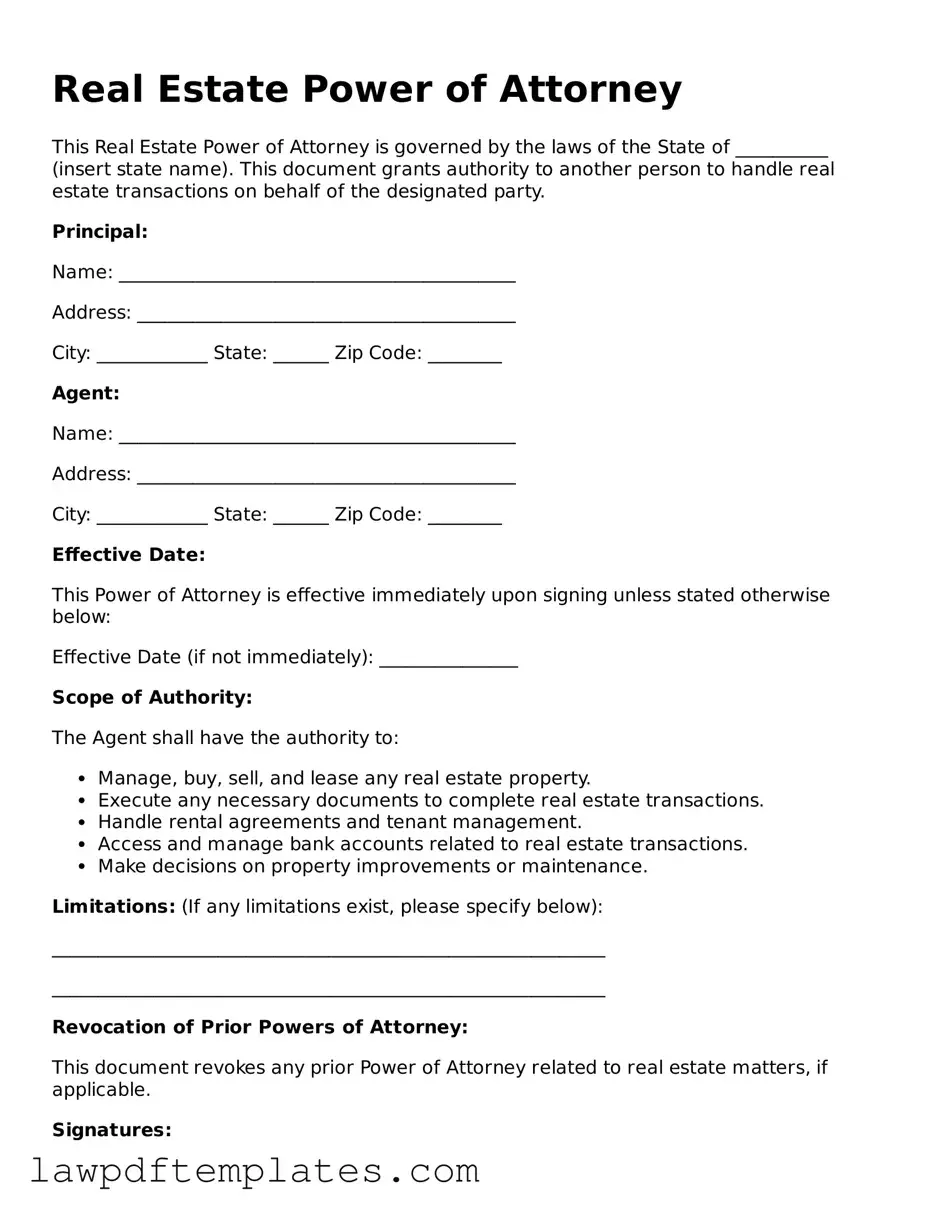Attorney-Approved Real Estate Power of Attorney Document
Form Breakdown
| Fact Name | Description |
|---|---|
| Definition | A Real Estate Power of Attorney allows one person to authorize another to act on their behalf in real estate transactions. |
| State-Specific Forms | Each state has its own specific requirements for the form. For example, in California, it is governed by the California Probate Code. |
| Types of Powers Granted | The document can grant broad or limited powers, including buying, selling, or managing property. |
| Revocation | The principal can revoke the power of attorney at any time, provided they are mentally competent. |
| Notarization Requirements | Most states require the Real Estate Power of Attorney to be notarized to be legally binding. |
Sample - Real Estate Power of Attorney Form
Real Estate Power of Attorney
This Real Estate Power of Attorney is governed by the laws of the State of __________ (insert state name). This document grants authority to another person to handle real estate transactions on behalf of the designated party.
Principal:
Name: ___________________________________________
Address: _________________________________________
City: ____________ State: ______ Zip Code: ________
Agent:
Name: ___________________________________________
Address: _________________________________________
City: ____________ State: ______ Zip Code: ________
Effective Date:
This Power of Attorney is effective immediately upon signing unless stated otherwise below:
Effective Date (if not immediately): _______________
Scope of Authority:
The Agent shall have the authority to:
- Manage, buy, sell, and lease any real estate property.
- Execute any necessary documents to complete real estate transactions.
- Handle rental agreements and tenant management.
- Access and manage bank accounts related to real estate transactions.
- Make decisions on property improvements or maintenance.
Limitations: (If any limitations exist, please specify below):
____________________________________________________________
____________________________________________________________
Revocation of Prior Powers of Attorney:
This document revokes any prior Power of Attorney related to real estate matters, if applicable.
Signatures:
IN WITNESS WHEREOF, the Principal has executed this Real Estate Power of Attorney on this ___ day of __________, 20__.
_____________________________
Principal's Signature
_____________________________
Witness Signature
_____________________________
Notary Public Signature
My commission expires: _______________
Common mistakes
Filling out a Real Estate Power of Attorney form can be a straightforward process, but mistakes often occur. One common error is failing to clearly identify the principal and the agent. The principal is the person granting authority, while the agent is the one receiving it. If either party's name is misspelled or incomplete, it can lead to confusion or invalidation of the document.
Another frequent mistake involves not specifying the powers granted. The form should explicitly state what authority the agent has concerning real estate transactions. Vague language can result in misunderstandings about what actions the agent can take, potentially leading to disputes later on.
People sometimes neglect to date the document. A date is crucial for establishing when the powers take effect. Without a date, it may be unclear whether the document is valid or if it has expired, especially if it was executed some time ago.
In some cases, individuals forget to sign the form. The signature of the principal is essential for the document to be legally binding. A missing signature can render the entire form ineffective, leaving the agent without the authority to act.
Witness requirements are often overlooked. Some states require that the Power of Attorney be witnessed by one or more individuals or notarized. Failing to meet these requirements can invalidate the document, so it is important to check local laws.
Another mistake is not keeping copies of the signed document. After completing the form, it is wise to make copies for both the principal and the agent. This ensures that both parties have access to the document and can refer to it when needed.
People may also overlook the need for a backup agent. If the designated agent is unable or unwilling to act, having a secondary agent can prevent complications. Not including this option can leave the principal without representation.
Some individuals do not consider the implications of granting broad powers. While it may seem convenient to give an agent wide-ranging authority, it can also lead to potential misuse. It is essential to carefully consider the extent of the powers being granted.
Lastly, failing to review the document before submission can lead to errors. Individuals should take the time to read through the completed form to ensure all information is accurate and complete. A thorough review can help catch mistakes that may otherwise go unnoticed.
Consider Popular Types of Real Estate Power of Attorney Documents
What Does Power of Attorney Cover - This form enhances your autonomy in decision-making during challenging times.
For those considering options for future planning, reviewing a proper form for a Power of Attorney is crucial. You can find more information about this important legal document by visiting our resource on the essential aspects of the Power of Attorney.
Poa Dmv - It helps avoid delays in vehicle transactions when you’re unavailable.
Power of Attorney Florida for Child - It's an essential document for single parents who may often need support.
